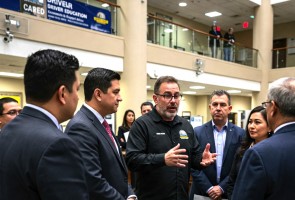
Driving Conversations: Government Officials
Government Officials Roundtable Summary
Date: March 5, 2025
Location: Virtual Meeting
Hosted by: ADTSEA-FL
Overview
ADTSEA-FL hosted a roundtable discussion with government officials to address key issues and opportunities in Florida’s driver education landscape. Participants included representatives from commercial driving schools, the Driving School Association of the Americas (DSAA), the Florida Department of Transportation (FDOT), the Florida Highway Safety and Motor Vehicles (FLHSMV), and the Florida Teen Safe Driving Coalition. The discussion focused on improving coordination among agencies, addressing legislative challenges, and standardizing driver education practices across the state.
Key Discussion Points
1. Bridging Communication Gaps
Participants highlighted the need for improved communication between driver education professionals, state agencies, and local governments. An attendee from FDOT emphasized the importance of defining "driver education professionals" broadly to include law enforcement, public school educators, and commercial driving instructors. Establishing a centralized resource for stakeholders to share information was recommended.
2. Legislative Updates
The group discussed House Bill HR889, which proposes making Driver Education mandatory in Florida. While ADTSEA-FL, as a nonprofit, cannot engage in lobbying, it can serve as a resource for tracking legislative developments and providing best practices for policymakers. Collaboration with the Florida Teen Safe Driving Coalition was identified as a key strategy for legislative engagement.
3. Standardizing Driver Education
Concerns were raised about inconsistencies in Florida’s Driver Education curriculum and the lack of oversight for commercial driving schools. Participants proposed creating a tiered certification system for Driver Education professionals and developing standardized instructional materials that align with national best practices.
4. Addressing Funding Challenges
Funding inconsistencies across different Driver Education programs were discussed, particularly in relation to public schools and commercial driving schools. An attendee from the FLHSMV pointed out the limited staffing available for monitoring driving schools and suggested exploring grant opportunities to support curriculum development and training initiatives.
5. Expanding Driver Education Beyond Teens
Several participants noted that many Floridians are waiting until they are over 18 to obtain a driver license, bypassing formal education requirements. The need to expand Driver Education programs for adult learners to include Florida-specific driving laws and situations was identified as a key area for improvement.
Next Steps
- ADTSEA-FL will compile feedback from this and previous roundtables into a report for internal review and strategic planning.
- A Google Form is available for further comment from stake holders who could not attend. Please share your thoughts.
- ADTSEA-FL will continue engaging with government officials and educators to explore opportunities for curriculum standardization and improved coordination between agencies.
For more information about ADTSEA-FL’s initiatives, contact us directly.

Past Articles

School District Administrator Round Table
Driver Education Driver Education Administrators, Coordinators, Officials, and Supervisors (DEACOS)...Read More

School District Teacher Round Table
Driver Education Teachers from around the state gathered to shape the future of...Read More

Commercial Driving School and Traffic Safety Professional Roundtable
Driving Conversations Roundtable Summary Date: February 26, 2025 Attendees: Representatives from...Read More

Teen Driver Survey
ADTSEA-FL Launches Teen Driver Survey to Hear Directly from Florida's Learners As part of our...Read More
